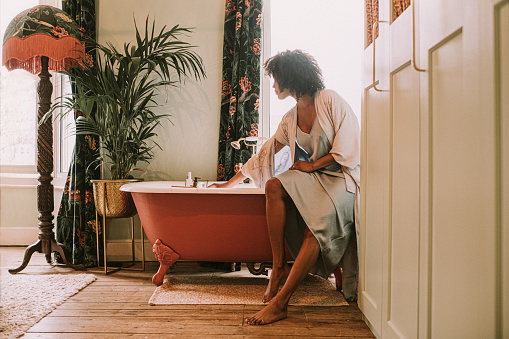The wellness industry is increasingly coming under fire for its lack of inclusivity and, in some cases, even fostering a dangerous approach to health. Here, we take a look at the darker side of the wellness trend.
From mindfulness to journaling, we’re all increasingly aware of the things we can do to improve our overall wellbeing. Our social media feeds are packed with tips, products and ‘experts’ who all seek – apparently – to make us more ‘well’.
And while investing in our health and wellbeing is undoubtedly A Good Thing, questions are being asked about the culture that surrounds wellness. Is our fixation on being the best version of ourselves actually making us more unhappy and unhealthy?
You may also like
Goop: “I went to Gwyneth Paltrow’s London wellness summit – and it was one hell of a ride”
The term first entered the collective psyche back in the 1950s, but it was from 1980 onwards that the idea of wellness became synonymous with a healthy lifestyle encompassing diet, fitness and emotional wellbeing. Since then, it’s exploded in popularity, thanks to celebrity endorsements (we’re looking at you, Gwyneth) and social media.
“The terms ‘health’ and ‘wellness’ are often used interchangeably,” explains chartered psychologist Catherine Hallissey. “However, there are differences between the two. Health is a state of wellbeing [that includes the absence] of illness, whereas wellness is the active process of living a healthy lifestyle. Put simply, health is the goal and wellness is a way of achieving that goal.”
The darker sides of wellness
When you take it at face value, wellness appears to be a positive thing. After all, who doesn’t want to be fit and healthy? Who doesn’t dream of glowing skin, having plenty of energy and feeling mentally balanced?
But there are those who now believe that the the ethos of the movement has changed. “I think we have lost the true meaning and intent of wellness,” claims Hallissey. “[By that, I mean] the daily actions that help you feel good, rather than a global industry of wellness that is intent on selling you things to achieve an impossible dream of the perfect life.”

Social media has warped our understanding of wellness
“I think social media has a lot to answer for,” says Dr Zoe Watson, GP and founder of wellbeing platform Wellgood Wellbeing. “People take the word of wellness influencers as fact. They take it seriously, but these people are often untrained and unregulated – a nice house by the beach and killer abs do not make influencers legitimate.”
Even the savviest of us can be seduced by glossy imagery, and if we factor in the demographic social media is aimed at, it’s “genuinely terrifying”, says Dr Watson. “Influencers have a huge reach and a captive audience, most of whom are young and easily influenced by what they consume online. And if that information isn’t accurate or rooted in science, then we have a big problem on our hands.”
It can make us suspicious of conventional medicine
Poor access to and/or treatment via conventional medicine can drive some people to seek alternative therapies. That might be fair enough, but the wellness industry tends to foster mistrust in medical science – and that can be incredibly dangerous.
“I definitely feel that unqualified wellness influencers have more impact than experts with professional medical qualifications,” says Dr Watson. “In some cases, the culture of ‘wellness’ is diluting the advice of medical professionals, and people are believing this misinformation.”
It’s an industry out to make money
It’s important to remember that wellness is obviously an industry, so its focus is on making money. “Gadgets and subscriptions may be all very well,” says Hallissey, “but in reality, the best things we can do are to go back to basics by focusing on eating well, sleeping well, moving our bodies, connecting with loved ones and spending time in nature.”
Being ‘well’ can play into perfectionism
“While the goal of becoming your best self may sound admirable, it can quickly become a stick to beat yourself with as the goal seems always just out of reach,” warns Hallissey. “It can also lead to obsessively focusing on wellness activities along with guilt and anxiety if you cannot engage in your full wellness routine each day.
You may also like
Fitness challenge: “5 new fitness activities that helped me beat perfectionism”
“The pursuit of wellness can tip into perfectionism, where people are spending extraordinary amounts of time and money to try to achieve a better and better life, time and money that would be better spent connecting with loved ones, having fun or giving back to your community – all activities that research links to reduced stress and greater resilience.”
Wellness and the lack of inclusivity and diversity
“There is definitely an element of privilege at play in the wellness industry,” says Hallissey. “It suggests that all it takes to live your best life is to follow a series of steps within your control, when the reality is that life circumstances have a very significant impact on true health and wellbeing that no amount of green juice will fix.”
Dr Watson agrees that the word ‘wellness’ “has become synonymous with white, rich, privileged and already healthy people telling others that they can manifest their best lives if they just do certain things.
“It’s an inaccessible, exclusive industry that simply isn’t relatable for the vast majority of people who live very normal lives. People who can’t afford to buy fresh produce every week, who are extremely busy and overwhelmed juggling work and childcare are excluded from the conversation.”
There’s an element of toxic positivity
Wellness and positivity go hand-in-hand. To feel good, you’ve got to think positive – even if living our best lives can feel out of reach on a drizzly Monday morning.
“While optimism and a positive outlook on life are beneficial to wellbeing and life satisfaction, it’s important to make space for the full range of human emotions, from pleasant to unpleasant,” advises Hallissey.
“Toxic positivity is the ‘good vibes only’ approach – the mistaken idea that you should stay positive no matter how difficult the circumstances. As well as being impossible, this façade doesn’t allow you space and time to process and learn from challenging experiences, which is a key feature of psychological wellbeing.”
How to make wellness work for you
All of the downsides are not to say that we can’t use wellness platforms in a healthy and beneficial way. With a few sensible adjustments, we can all access good quality, well-researched information and advice that we can use to move towards a more balanced and sustainable lifestyle.

“Wellness can be an empowering and affirming approach to health and healthy living,” insists Hallissey. “I believe the solution is to focus on the daily actions that help you feel good: eating well, sleeping well, moving your body, connecting with loved ones and spending time in nature.
“Not only will you save money by not buying into the latest wellness trend, focusing on these things has been proven to improve our health.”
And Dr Watson agrees. “Self-improvement is overrated. Instead, let’s strive for self-acceptance. If we learn to love ourselves, for exactly who and what we are, everything else falls into place naturally.”
Images: Getty
Source: Read Full Article
